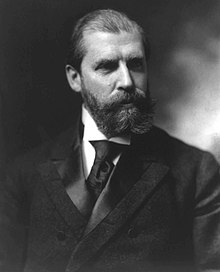Charles Evans Hughes
Charles Evans Hughes (born April 11, 1862 in Glens Falls , Warren County , New York , † August 27, 1948 in Osterville , Massachusetts ) was an American politician and lawyer . He served as Governor of the State of New York, as Secretary of State , as a judge at the International Court of Justice as well as the Presiding Judge at the Supreme Court of the United States .
Life
Hughes was a precocious child. At the age of six, he decided to quit school, which he found boring, and devised his own curriculum. With the consent of his parents, he practiced this curriculum in his home. Shortly before his twelfth birthday, his family moved to New York City , where he now attended and graduated from a public school. Hughes was also according to the beliefs of the Baptist raised.
He attended prestigious universities such as Madison College (now Colgate University ), Brown University and later Columbia Law School , from which he graduated with honors. To finance his law studies, he was already teaching ancient Greek , Latin and mathematics at the Delaware Academy at the age of 19 .
Starting in 1905, Hughes worked as a legal advisor to the New York state government and uncovered several cases of corruption . From 1907 to 1910 he held the office of governor. Hughes was then appointed to the Supreme Court , where he remained until 1916. From this office he resigned in June after his nomination as Republican candidate for the 1916 presidential election , which he narrowly lost to Woodrow Wilson in November . In 1918 Hughes was elected to the American Academy of Arts and Sciences .
When Warren G. Harding was elected President in 1921 , Hughes was appointed Secretary of State in his cabinet . During his four-year tenure, he convened the Washington Naval Conference , at which the geopolitical interests of Japan , Russia , Great Britain , France , Holland , Italy , Belgium , the Republic of China and the USA in the South Pacific were negotiated. He was also foreign minister in the government cabinet of Calvin Coolidge until 1925. In 1926 he was elected a member of the American Philosophical Society .
Hughes also made a merit as a judge at the Permanent International Court of Justice in The Hague (1928–1930). The last stop in his career was the post of Chief Justice of the United States , the country's highest judge, which he held until 1941. In this capacity, Hughes was a bitter opponent of President Franklin D. Roosevelt , who wanted to occupy the Supreme Court with his people after it had overturned many of his New Deal laws.
Charles Evans Hughes died in 1948. His son Charles Jr. also pursued a legal career and served from 1929 to 1930 as the United States Solicitor General .
aftermath
Hughes is the namesake of the Hughes Range , a mountain range in the Transantarctic Mountains . The name was given at the request of the American polar explorer Richard Evelyn Byrd , who discovered the mountain range during the flight to the South Pole on November 29, 1929 as part of his first Antarctic expedition, the Byrd Antarctic Expedition (1928-1930). Hughes had advised Byrd on this expedition.
literature
- Karen Miller: Charles Evans Hughes. In: Edward S. Mihalkanin (Ed.): American Statesmen: Secretaries of State from John Jay to Colin Powell . Greenwood Publishing 2004, ISBN 978-0-313-30828-4 , pp. 254-262.
Web links
- Literature by and about Charles Evans Hughes in the catalog of the German National Library
- Newspaper article about Charles Evans Hughes in the 20th century press kit of the ZBW - Leibniz Information Center for Economics .
- Charles Evans Hughes in the database of Find a Grave (English)
- Charles Evans Hughes in the National Governors Association (English)
- Charles Evans Hughes in the Miller Center of Public Affairs of the University of Virginia (English)
Individual evidence
- ^ Member History: Charles E. Hughes. American Philosophical Society, accessed October 5, 2018 .
- ↑ Hughes Range. Information on geographic.org (accessed November 3, 2015).
| personal data | |
|---|---|
| SURNAME | Hughes, Charles Evans |
| BRIEF DESCRIPTION | American politician and lawyer |
| DATE OF BIRTH | April 11, 1862 |
| PLACE OF BIRTH | Glens Falls , New York |
| DATE OF DEATH | August 27, 1948 |
| Place of death | Osterville , Massachusetts |



